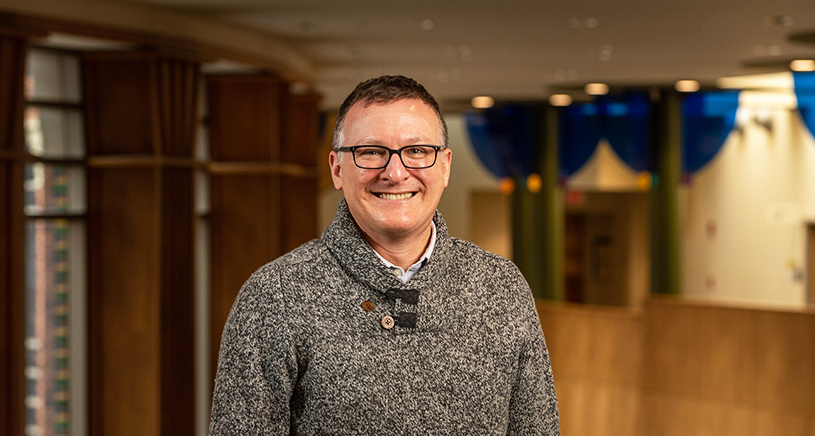The Best of Both Worlds: Using Applied Research to Keep Workers Healthy and Safe

Rick Neitzel
Associate Professor and Associate Chair, Environmental Health Sciences
The best of both worlds: Using applied research to keep workers healthy and safe
Rick Neitzel didn't always want to be an industrial hygienist or a professor.
In college he explored programs in aerospace engineering and aviation safety before finally settling on a safety program. But it wasn't until he took a class on industrial hygiene that he knew he'd found his calling.
"I realized then what terrible conditions workers are sometimes forced to work in, and that there are industrial hygienists out there striving to keep those workers healthy and safe," he says. "That really appealed to me."
So, after completing his Bachelor of Science degree, he continued on to do complete Master of Science and doctorate degrees in industrial hygiene. He fully intended to work in industry after graduating. "I wanted to actually make a difference, not just be a professor sitting in a lab!" he says.
However, he realized it was possible to get the best of both worlds by doing applied, field-based occupational health research in partnership with workers and employers, and then working with those groups to act on the research results and improve working conditions.
Today, Neitzel is an associate professor and associate chair of the Department of Environmental Health Sciences at the University of Michigan School of Public Health, and his research takes him all over the world, from Sweden to Chile to Thailand and beyond.
Health impacts of e-waste
One area of focus for Neitzel is on the health implications of electronic waste, or e-waste, which refers to electronic devices such as cell phones and computers that are thrown away or sent to be recycled.
The US sends most of its recycled electronics to China and Africa, and European e-waste often ends up in Africa and South Asia. Most often, Neitzel says, people in some of the poorest areas end up processing the e-waste because of the income potential this work presents. But along with the financial benefits come serious health risks.
"They are essentially taking tools and smashing metal apart," he says. "Doing so releases a lot of contaminants into the environment, and even into their food supply. And in these areas, the workers don't have a lot of access to safety equipment."
Despite the health and safety risks, Neitzel is clear that he doesn't want to shut down the e-waste processing operations, as they are a much-needed financial driver for these workers and their communities. Instead, he and his team want to help make them safer and ensure that the metal exposures aren't putting the workers, their families, or their communities at risk.
Noise exposure and cardiovascular health
Neitzel is among a handful of researchers in the US looking at the connection between noise exposure and health. Although, he points out that researchers in Europe have already done a lot of research in this area. Their studies have shown a connection between noise and cardiovascular issues, like high blood pressure and an increased risk for heart attack.
"In the US we haven't really looked at noise. It's just not a priority here, and people have come to tolerate noise as a byproduct of technology," he says. "If people knew it might give them a heart attack, they might have a different perspective."
People who work in factories often experience extended noise exposure, as do those who live near an airport or freeway.
"We've spent a lot of timing looking at air pollution and how it's connected to cardiovascular disease," Neitzel says. "What if it's not just pollution, but pollution combined with noise?"
Neitzel is especially interested in looking at situations in which people are exposed to several things--for instance, pollution, noise, and stress--and determining how that impacts their cardiovascular health.
"We have people with a bunch of different exposures that can all cause the same outcome," he says. "I want to understand which causes the most impact? Do they all compound onto each other?"
The highlight of his career
In 2017, Neitzel was recognized with the University of Michigan School of Public Health Excellence in Teaching Award, which he calls the highlight of his career.
Teaching and interaction with students are his favorite parts of the job. He says he especially enjoys taking students abroad to work on projects and experience what public health is like in a completely different setting.
He creates opportunities for public health students to collaborate with students from other University of Michigan schools, like the College of Engineering and the Ford School of Public Policy, as well as students studying in the countries where they are working.
"It's a chance for them to learn about each other's education, to talk and work together, and learn not just from me but from each other," he says.
- Find out more about EHS.
- Hear more from Rick Neitzel on noise exposure.
- Interested in public health? Learn more here.
